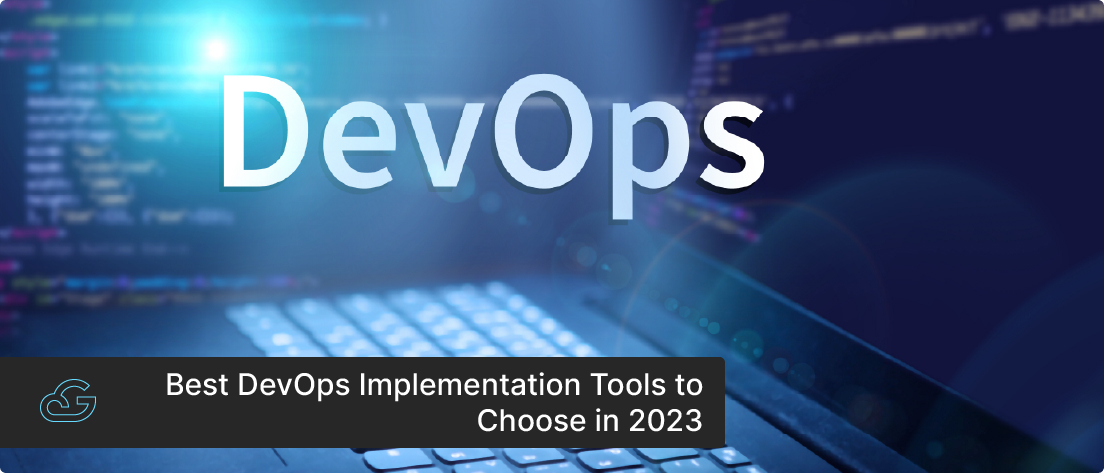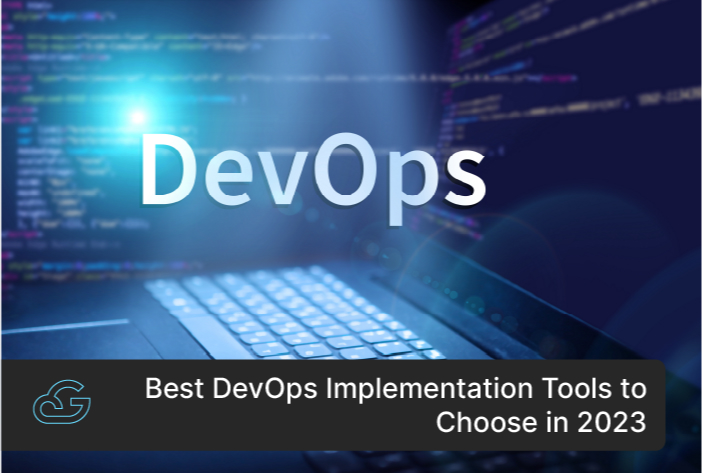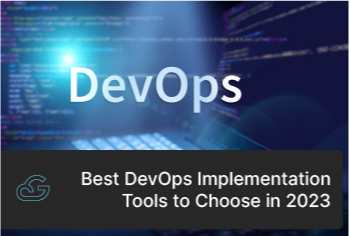Blogs / DevOps and Automation
Best DevOps Implementation Tools To Choose In 2023
By
Harish K K
Posted: July 18, 2023
• 4 Min Read
The adoption of DevOps in enterprises has experienced significant growth, with stakeholders increasingly reaping its benefits. As per reports, ‘DevOps Market size was valued at USD 3.62 Billion in 2018 and is projected to reach USD 20.01 Billion by 2026, growing at a CAGR of 24.7% from 2019 to 2026’. A successful DevOps implementation involves unifying cross-functional efforts, and integrating task-specific toolchains where planning, creation, verification, packaging, releasing, configuring, monitoring, and version control come together.
The most prominent benefits that the DevOps culture has brought into the enterprise are the effective collaboration between software development and operation teams and the automation of application development processes. Adopting the right toolchains is crucial for enterprises to achieve faster go-to-market and business productivity without compromising application security.
How to Choose the Right DevOps Tools?
Modern DevOps tools are designed to meet the emerging needs of the enterprise app ecosystem. While there are numerous tools to support your DevOps team, selecting the right stack is crucial for a successful DevOps implementation.
The following are some key criteria to help you make the right decision in this regard.
5 Best DevOps Implementation Tools
Gsoft utilizes some of the best DevOps tools in the industry. Take a look at some of them along with their capabilities to understand how well they can fit into your development workflows.
- CI/CD automation
-
Continuous integration of any combination of coding language and source code repositories
-
Hundreds of internal and external plugins to build, deliver and automate any project virtually
-
Simple and clean GUI to view builds and branches of code
-
Access to build history and possible errors that may occur
-
+2,000 plugins to configure and customize specific requirements
-
Support for multiple OS - Windows, macOS X, and Unix OSS
-
Wider compatibility with the existing CI/CD integration tool and servers
-
Supports distributed workflow for an accelerated and transparent build, test, and deployments
-
Supports tasks distribution across multiple machines
- Configuration Management
-
Compatible with Windows, macOS, Linux, and Unix systems
-
Seamless integration with other tools such as Jenkins
-
Various built-in modules to automate, configure, deploy, and orchestrate IT infrastructure
-
Eliminates repetitive tasks with YAML templates
-
Easy to write configuration modules with minimal commands
-
Agentless system for easy management and storage
-
Automated configuration and provisioning of infrastructure through code
-
Runs in server/client mode, or as a standalone configuration tool
-
Support for multiple data centers and cloud environments such as Amazon EC2, Microsoft Azure,Google Cloud Platform, Internap, SoftLayer, and Rackspace
-
Support for multiple Operating Systems - Windows, macOS, Ubuntu, Solaris, FreeBSD, RHEL/CentOS,AIX, Fedora, and Debian
-
Master-agent architecture to control configurations from master to agent
-
Cookbook to define configuration scenarios that contain recipes, attributes, custom resources, libraries, files, templates, tests, and metadata
-
Maintain high server availability
-
Compatible with Windows, Unix-like, and Linux, operating systems
-
Model-driven tool that requires minimal programming
-
Flexibility to define infrastructure using a declarative language
-
Agentless automation Infrastructure scaling through code
-
Eliminates manual tasks within the software delivery process
-
Intelligent orchestration and visual workflows
-
Real-time context-aware reporting
- Communication and Collaboration
-
End-to-end project planning, task assignment, issue tracking, and reporting
-
Easier backlog prioritization
-
Agile software development with Scrum and Kanban boards
-
Drag-and-drop interface to create automation rules
-
Integration with Bitbucket, GitHub, and Microsoft Teams to automate workflow
-
Real-time team collaboration through Kanban dashboards
-
Access to multiple boards to work on different projects simultaneously
-
Customized templates
-
Reporting/Project tracking
-
Real-time updates
-
Project planning and scheduling
-
Support for multiple operating systems including Windows, macOS, Linux, FreeBSD, OpenBSD
-
Capability to manage hundreds of cloud services via a consistent CLI (Command Line Interface) workflow
-
Supports infrastructure provisioning for over 300 services across multiple public clouds using unified workflows
-
Auto-rollback feature upon failure
-
Supports a multitude of cloud infrastructure providers such as Amazon Web Services, Cloudflare, Microsoft Azure, IBM Cloud, Google Cloud Platform, Oracle Cloud Infrastructure, VMware vSphere etc
- Container Orchestration
-
Progressive rollout and rollback of changes to software
-
Multiple storage options from local to public clouds and network storage solutions such as AWS or GCP, NFS or Gluster respectively
-
Automatic placement of containers based on resource requirements
-
Service Discovery and load balancing
-
Automatic storage orchestration
-
Runs on Windows, macOS, and Linux
-
Integration with deployment pipeline tools such as CircleCI, GitHub etc
-
Support for cloud platforms such as Azure Cloud, AWS, and Google Cloud Platform
-
Simple and flexible image management using a private registry
- Version Control
-
Support for Windows, macOS, Linux, Solaris, and AIX
-
Integration with GitHub and Bitbucket
-
Integration with IDEs such as Eclipse, VS Code, and IntelliJ
-
Capabilities to handle projects of different scales
• Jenkins
Jenkins is one of the best open-source DevOps tools used for monitoring, executing, and automating repetitive tasks in the CI/CD process. Jenkins stands out as a scalable CI/CD automation tool that can be deployed on cloud-based platforms, providing a robust procedure for integrating the entire DevOps chain.
Key Features
• Ansible
Ansible is an open-source configuration management tool for the automation, orchestration, configuration, and managing IT Infrastructures. The Python-based tool leverages infrastructure as a code architecture for provisioning and configuring infrastructure. As a more straightforward and less device-intensive tool, Ansible runs in the background without slowing down your system. Ansible provides scalability and faster replication by pushing changes within your system and configuring new machines.
Key Features
• Chef
An open-source configuration management tool based on Ruby, used to automate infrastructure provisioning. When compared to Ansible, Chef offers low-cost configuration management that works well with large-scale systems. Its flexible cloud infrastructure automation framework allows users to install the apps to bare metal VMs and cloud containers and manage the infrastructure through code (IaC) rather than using manual processes. An excellent alternative to Ansible, Chef is more cost-effective and performs well with large-scale systems.
Key Features
• Puppet
Another open-source tool in the configuration management line, Puppet allows for managing various development lifecycle stages, including the provisioning of IT infrastructure and patching. Ideal for complex infrastructures or enterprises with limited resources, this tool helps optimize resources for better output.
Key Features
• Jira
Jira is the most popular communication and collaboration tool used for tracking issues and managing projects throughout the development cycle. It is available as a SaaS solution or as an on-premises solution.
Key Features
• Trello
A popular Kanban-based collaborative task management tool that offers productivity and project management solutions for agile project management, customer support tracking, sales pipeline etc. Trello’s simple and interactive workflow helps teams develop a shared perspective on projects of all kinds in a flexible and engaging way.
Key Features
• Terraform
Terraform is an open-source Infrastructure as Code (IaC) tool utilized for provisioning and automating various infrastructure tasks. It is used to build, change, and version infrastructure securely and efficiently. The tool helps to define and provision infrastructure using a declarative configuration language known as HashiCorp Configuration Language (HCL).
Key Features
• Kubernetes
The most popular open-source container orchestration tool Kubernetes allows to deploy, manage, and scale container-based software across Kubernetes clusters. It schedules workloads onto compute cluster nodes and manages them dynamically. Cloud developers harness Kubernetes to automate these processes and isolate and package container clusters for easy deployment for attaining speed and efficiency in production.
Key Features
• Docker
Docker a Linux-based open-source/commercial platform that contains a suite of DevOps automation tools to create containerized environments for apps, make them more portable, secure and reduce conflicts when testing. The tool helps in automating the development, deployment, and management of containerized applications with a unified workflow. Enterprises leverage its user-friendly platform to develop faster and more precisely while optimizing resource utilization.
Key Features
• Git
One of the most widely used version control tools in the industry, Git is used to tracking changes in files in a collaborative environment and helps manage work effectively among developers. The open-source tool uses distributed Source Code Management (SCM) model, allowing developers to track the progress of development tasks and maintain different versions of the source code.
Key Features
Conclusion
Selecting the right tools is just half the journey – the support provided by an expert cloud service provider such as GSoft, is essential for the success of any large-scale DevOps deployment. Consult with our cloud computing experts if you have any queries related to choosing the best tools for your organization.


Get Know More About Our Services and Products
Reach to us if you have any queries on any of our products or Services.











